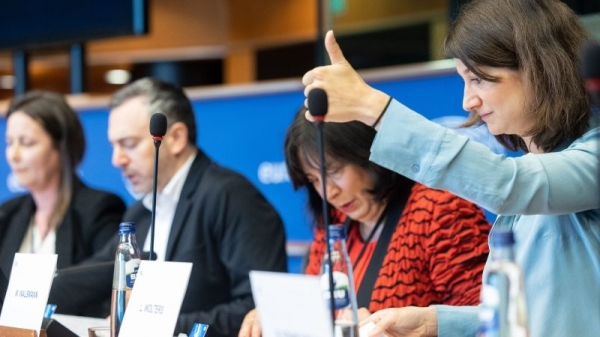EU lawmakers adopt due diligence rules position ahead of key plenary vote

The legal affairs committee of the European Parliament voted in favour of a common position on EU rules to hold companies accountable for human rights and environmental breaches on Tuesday (25 April), paving the way for a final plenary vote on 1 June.
The corporate sustainability due diligence directive, presented by the European Commission in February 2022, is set to hold companies based or operating in the EU responsible for human rights and environmental violations in their value chain.
The proposed directive sets out the rules regulating due diligence obligations to ensure companies identify, prevent and mitigate adverse impacts on human rights or the environment due to their activities.
Member states already reached an agreement at the EU Council last December, while negotiations in the Parliament took longer than expected due to different positions of political groups on some key aspects of the proposal, such as the inclusion of SMEs and the ‘use’ of products and services in the scope of the directive.
The EU Council and the Parliament must both agree a position in parallel, before meeting for inter-institutional negotiations, known as ‘trilogues’, with the Commission.
Delighted by the resounding majority in favour of corporate Due Diligence in the @EP_Legal vote ! This is a huge step towards a European law that will make clear that doing business in the 21st century means doing business responsibly.
Next step ➡️ Plenary on 1 June pic.twitter.com/6DMlsQ8xni
— Lara Wolters (@larawoltersEU) April 25, 2023
“I think that we have struck a deal here that is proportionate, workable and that should create an advantage for everyone in the long run,” rapporteur Lara Wolters told reporters before the vote.
The compromise text approved at the committee level must now go through a plenary vote to enshrine the Parliament’s official position on the file.
Financial sector
According to the MEPs’ compromise text, due diligence rules should apply to the financial sector. The compromise includes asset managers and institutional investors within its scope, but excludes pension funds, alternative investment funds, market operators and credit rating agencies.
However, in their common position, EU countries opted to leave the inclusion of financial services under mandatory due diligence obligations as optional for member states.
“This will definitely be a big point of negotiation with the Council,” Wolters said.
Many civil society organisations unsatisfied with the less stringent requirements for finance agreed by EU lawmakers, which limit due diligence checks to direct clients.
“We urge the European Parliament to reconsider this in the next steps of the process,” Isabella Ritter, EU policy officer at ShareAction, said following the vote.
Wolters, however, said that it was “very important to make sure that the negotiations on the financial sector didn’t derail us” during the internal negotiations.
Climate due diligence
On climate, MEPs voted in favour of introducing climate transition plans in line with the objectives of the Paris Agreement.
The report also calls for ensuring directors of companies with over 1,000 employees are responsible for due diligence checks, with a part of their variable remuneration linked to the company’s transition plans.
Member states opposed any link between due diligence obligations and directors’ remuneration in their negotiating position.
‘Red lines’
The compromise voted on Tuesday was reached after lengthy negotiations, due to the opposition of political groups, especially EPP and Renew, to some key points of the proposal.
SMEs were left out from the scope of the directive as they were “absolute red line”, Wolters said, adding that the use of product and services was also a contentious point that was eventually excluded.

EU Parliament excludes ‘use’ from due diligence rules before committee vote
The leading legal affairs committee of the European Parliament is set to vote on its position on the proposed corporate accountability rules next week, following an agreement reached by negotiators on Tuesday (18 April).
On the night of 18 April, members …
EU lawmakers also agreed to leave the burden of proof on the claimants and not on companies, meaning that victims will have to prove the existence of adverse impacts linked to a company’s activities.
“I made sure that if member states do want to introduce a reversed burden of proof, then that they can,” Wolters said, adding that access to justice was also strengthen in the compromise to rebalance the burden of proof.
Welcomed vote
Despite some concerns, the committee’s position was broadly welcomed by NGOs and EU lawmakers.
Pascal Canfin, a Renew MEP and President of the Parliament’s Environment Committee, welcomed the vote. He had previously come out in support of linking variable remuneration to sustainability objectives.
“I have been fighting for two years for the mandatory inclusion of climate targets in the bonuses of the executive directors of large companies. This is very good news to be confirmed in a few weeks in plenary,” he said.
Social democrat MEP René Repasi, rapporteur on the file in the economic and monetary affairs committee, welcomed the inclusion of the financial sector in the scope of the directive.
“The fact that an entire sector was removed from the Council’s text at all is due to a massive lobbying offensive by the financial sector,” he warned, hinting to tough ‘trilogue’ negotiations ahead.
However, business associations have been critical of the proposal, arguing that it would put an excessive bureaucratic burden on companies.
“The European Parliament should set an example and not increase the bureaucratic burden on European companies,” Thilo Brodtmann, VDMA executive director, said commenting on the vote.
“We need a manageable due diligence law to avoid further jeopardising the competitiveness of European companies,” he added.

German conservatives query EU green reporting rules in call to cut bureaucracy
EU environmental reporting rules cause an administrative burden for companies and should be measured against the burden they would cause each time they are adopted, a plan to curb costs and bureaucracy for companies presented by German conservatives reads.
Next steps
The Parliament is now expected to vote on the report during the plenary session on 1 June, while negotiations with EU member states should begin during the summer.
“It is my intention to start negotiations with the Council as soon as possible,” Wolters said, mentioning the need to reach an inter-institutional agreement by the end of the year, before next year’s European elections.
“I don’t want to get into a situation where […] this gets too muddled up in the wider electoral campaigns,” she said.
More on the same topic...




